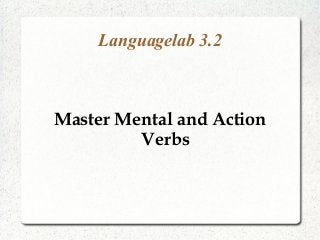Languagelab 3.2 - Master Mental and Action Verbs
•
1 gefällt mir•1,455 views
Verbs form the 'action' in sentences. In this topic, we discuss the two most important ones - mental and action verbs. Share on FB and redeem all worksheets or download samples from www.languagelab.sg/books.
Melden
Teilen
Melden
Teilen

Empfohlen
Empfohlen
Weitere ähnliche Inhalte
Mehr von Designlab Innovation
Mehr von Designlab Innovation (20)
Youth Entrepreneurship Skills (YES) Program by Designlab

Youth Entrepreneurship Skills (YES) Program by Designlab
Languagelab 25.1 - Master Subject Verb Rules and Exceptions

Languagelab 25.1 - Master Subject Verb Rules and Exceptions
Kürzlich hochgeladen
Kürzlich hochgeladen (20)
Mixin Classes in Odoo 17 How to Extend Models Using Mixin Classes

Mixin Classes in Odoo 17 How to Extend Models Using Mixin Classes
Measures of Central Tendency: Mean, Median and Mode

Measures of Central Tendency: Mean, Median and Mode
This PowerPoint helps students to consider the concept of infinity.

This PowerPoint helps students to consider the concept of infinity.
Presentation by Andreas Schleicher Tackling the School Absenteeism Crisis 30 ...

Presentation by Andreas Schleicher Tackling the School Absenteeism Crisis 30 ...
Ecological Succession. ( ECOSYSTEM, B. Pharmacy, 1st Year, Sem-II, Environmen...

Ecological Succession. ( ECOSYSTEM, B. Pharmacy, 1st Year, Sem-II, Environmen...
SECOND SEMESTER TOPIC COVERAGE SY 2023-2024 Trends, Networks, and Critical Th...

SECOND SEMESTER TOPIC COVERAGE SY 2023-2024 Trends, Networks, and Critical Th...
Seal of Good Local Governance (SGLG) 2024Final.pptx

Seal of Good Local Governance (SGLG) 2024Final.pptx
Basic Civil Engineering first year Notes- Chapter 4 Building.pptx

Basic Civil Engineering first year Notes- Chapter 4 Building.pptx
Languagelab 3.2 - Master Mental and Action Verbs
- 1. Languagelab 3.2 Master Mental and Action Verbs
- 2. Recall: Nouns and Verbs 1) James swims. 2) Corrine jogs. 3) David reads. 4) Jamie cycles. 5) David and James study together. 6) Jamie and Corrine play together. These are complete sentences because they each have a Noun and a Verb in them. Can you tell what are they?
- 3. Nouns and Verbs In the previous sentences, they are all Proper Nouns – specific names given to specific people or things. Verbs are important too. They describe what the subjects (or the Nouns) are doing. Without verbs, the sentences will be incomplete.
- 4. Challenge Q: Can you give a sentence with no Nouns or Verbs?
- 5. No Challenge! A: You can't because there's no such sentence! All sentences must come with a Noun and a Verb.
- 6. Types of Verbs Verbs describe what your characters and other subjects are doing The verb carries the key idea. Verbs are also called action words as they are all about action of some kind. We will talk about two types of Verbs that are most common in most sentences - Action and Mental Verbs.
- 7. Action Verbs Action Verbs show physical action. Verbs like swim, study, read, play, run and jog are all Action Verbs as they involve movement of the body. Q: Can you think of other Action Verbs?
- 8. Examples of Action Verbs In school : exercise, study, revise, learn, read, write, count, draw. At home : Sleep, eat, play, dream, do, clean, nap, feed
- 9. Mental Verbs Mental Verbs are verbs which show mental action. Verbs like think, decide, reflect, consider and pause are all Mental Verbs as they involve motion too, in this case, mental processes of the mind. Q: Can you think of other Mental Verbs?
- 10. Verbs Change Meanings Different Verbs, Different Meanings 1) Jamie was playing with her friend. (action) 2) Jamie was fighting with her friend. (action) 3) Jamie was studying with her friend. (action) 4) Mary was mad at her friend. (mental) 5) Mary was thinking about her friend. (mental) 6) Mary remembered her friend. (mental)
- 11. Learning Activity Complete the following sentences with verbs of your own. He likes to _______ for his pastime. He likes to _______ for his pastime. He likes to _______ for his pastime. They are _______ ; please don't disturb them. They are _______ ; please don't disturb them. They are _______ ; please don't disturb them.
- 12. Learning Activity Answers Complete the following sentences with verbs of your own. He likes to sleep for his pastime. He likes to swim for his pastime. He likes to read for his pastime. They are reading ; please don't disturb them. They are studying ; please don't disturb them. They are resting ; please don't disturb them.
- 13. Learning Milestones Why are Verbs important in a sentence? What are they often called? What are the two types of verbs discussed today and what do they mean? What happens if we change the verb in a sentence, while everything else remains the same?
- 14. Learning Milestone Check Verbs convey key ideas. They are often called action words. We discuss two main types of verbs – action and mental. Action verbs describe physical movements while mental verbs describe processes in the brain. Changing a verb changes the entire meaning of a sentence.
- 15. Share and Redeem! Share about this topic on our Facebook Page and redeem worksheets (total 10 pages) on 'Master Action and Mental Verbs'!
- 16. More on Master Action and Mental Verbs Download sample worksheets from: www.languagelab.sg/books (Look for Learning Guide 3) OR Download 'Playwerkz' from Google Playstore:
